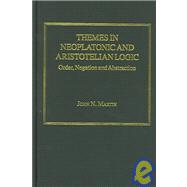Themes in Neoplatonic and Aristotelian Logic: Order, Negation and Abstraction
, by Martin,John N.- ISBN: 9780754608110 | 0754608115
- Cover: Hardcover
- Copyright: 11/28/2004
Were the most serious philosophers of the millennium A.D. 200 to A.D. 1200 just confused mystics? This book shows that such was not the case. John Martin rehabilitates Neoplatonism, founded by Plotinus and brought into Christianity by St Augustine. The Neoplatonists devise ranking predicates like good, excellent, perfect to divide the Chain of Being, and use the predicate intensifier hyper so that it becomes a valid logical argument to reason from God is not (merely) good to God is hyper-good. In this way the relational facts underlying reality find expression in Aristotle's subjectpredicate statements, and the Platonic tradition proves able to subsume Aristotle's logic while at the same time rejecting his metaphysics. In the Middle Ages, when Aristotle's larger philosophy was recovered and joined again to the Neoplatonic tradition which was never lost, Neoplatonic logic lived alongside Aristotle's metaphysics in a sometimes confusing and unsettled way. Showing Neoplatonism to be significantly richer in its logical and philosophical ideas than it is usually given credit for, this book will be of interest not just to historians of logic, but to philosophers, logicians, linguists, and theologians.






